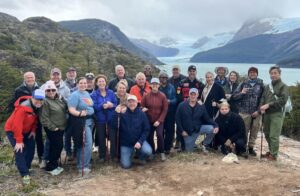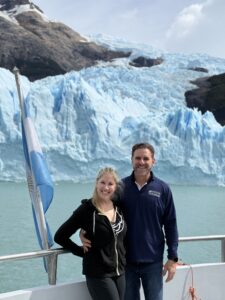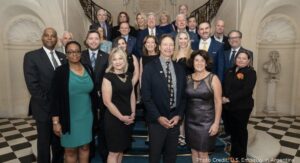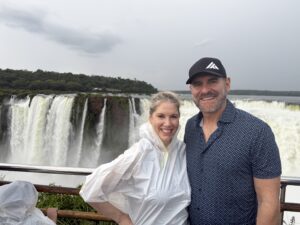Our delegation embarked on an insightful mission to Argentina, engaging with key economic leaders and policymakers to gain a deeper understanding of the country’s financial landscape. The trip took us from the bustling capital of Buenos Aires to the breathtaking Iguazu Falls and the majestic glaciers of Patagonia. Along the way, we had the privilege of meeting some influential figures in Argentina’s economic and financial sectors.

Key Meetings and Insights
We were honored to meet with:
- Pablo Quirno, Secretary of Finance, who provided an in-depth overview of Argentina’s current financial policies.
- Roberto Silva, President of the CNV (Argentina’s equivalent of the U.S. SEC), who shared insights on financial regulation and market stability.
- Robert Olsen, Head of Global Markets at BNP Paribas, who discussed Argentina’s position in the global financial system.
- Vladimir Werning, Deputy Governor of the Central Bank of Argentina, who elaborated on monetary policies and inflation control.
- Alberto Benegas Lynch, Jr., Economic Advisor and key influencer of President Javier Milei, who explained Milei’s economic philosophy and reforms.
- Frederico Luchi, Director of Argentina at Bank of America, a key economic strategist who shed light on deregulation efforts, financial planning, and asset management in the region.
- Sabrina Castelli, Founder and CEO of Mujer Financiera, who emphasized the importance of financial literacy for women in Argentina.
- Ricardo Dessy, Citibank Director of Economics, Government, and Public Affairs, who provided insights on Argentina’s evolving financial landscape.
- Abbigail Dressel, Chargé d’Affaires at the U.S. Embassy, along with Eric Olsen, Regional Senior Commercial Officer, and Jessica Kuhn, U.S. Embassy Foreign Service Officer, who welcomed our delegation and facilitated discussions on U.S.-Argentina relations.
- Marin Seay, who led our delegation’s presentation of CFP Board research, highlighting the global impact of financial planning and regulatory practices.

Unique Travel Companions and Hosts
We were fortunate to travel with fascinating guests, including:
- Stefano Luporini, a 25-year-old doctor, and his brother Santiago Luporini, an oral surgeon, who provided unique perspectives on Argentina’s healthcare and economic conditions.
- David Smith and Sonia Ruseler, journalists and wine producers from Mendoza, known for their Sonvida Wine.
- Our dedicated hosts, Wendy Pangburn and Judy Guy, who played a pivotal role in organizing the trip.
- Our exceptional interpreter, Lucile Olsen Huber, who ensured smooth communication throughout.
- Adriana and Ileana Aiello, the dynamic sister duo, whose deep network of connections, along with Lucile, secured our impressive lineup of meetings.

Exploring Argentina’s Natural Wonders
While much of our time was dedicated to economic discussions, we also had the chance to experience Argentina’s natural beauty:
- A yacht trip to Patagonia, where we witnessed the stunning glaciers up close.
- A helicopter tour of Iguazú Falls, allowing us to see this natural wonder from both the Argentine and Brazilian sides.
Economic Takeaways: Milei’s Reforms and Argentina’s Future
The prevailing sentiment among Argentine economic leaders is one of high approval ratings for President Javier Milei. Unlike career politicians, Milei is first and foremost an economist, implementing libertarian policies to address Argentina’s long-standing economic struggles.
Key economic observations:
- Inflation is at a record low of 2.2% per month (26% annually)—a significant improvement from the 211% inflation rate in 2023 and 118% in 2024.
- Economic leaders celebrate this progress, noting that while the U.S. struggled with 13.5% inflation over 2 years in 2022 and 2023, Argentina’s numbers had previously been far worse.
- There is a strong consensus that populism has failed and that deregulation is the key to future economic stability.
- Both the U.S. and Argentina are focused on deregulating their economies, with Argentina’s Regulation Ministry playing a similar role to the U.S. Department of Energy’s (DOE) deregulation efforts.
Experiencing Inflation Firsthand
A personal experience during the trip made Argentina’s inflation crisis incredibly real for me. When Delta lost my suitcase, I had to buy new clothes in Buenos Aires. Expecting reasonable prices, I visited Max Mara, where a cardigan set, skirt, and shoes cost $5,000 USD—five times what I would pay in the U.S. Even shopping at Zara, known for affordability in the U.S., I found nothing under $100 USD, and my total purchase came to $500 USD for an outfit that would cost $120 in the U.S.
This stark disparity underscores how inflation and economic instability distort everyday life. The purchasing power of money can disappear overnight, forcing people to spend quickly rather than save—a mindset completely opposite to the financial principles we teach in the U.S.

Argentina’s Economic Crisis of 2001: A Lasting Impact
In my opinion, one of Argentina’s most defining economic events was the crisis of 2001, which saw five presidents take office in just two weeks. The crisis stemmed from years of mounting debt, an overvalued currency pegged to the U.S. dollar, and a loss of investor confidence. As the economy spiraled out of control, the government restricted bank withdrawals, leading to widespread protests and social unrest. The financial system collapsed, unemployment soared, and the middle class saw their savings wiped out overnight.
This event left a lasting imprint on Argentina’s financial psyche, fostering a deep distrust of banks and encouraging citizens to store their wealth in U.S. dollars, gold, or real estate rather than relying on traditional financial institutions. The aftermath of 2001 continues to shape Argentina’s economic policies today, influencing the country’s approach to currency management, banking, and debt restructuring.
The Psychological Impact on Wealth Planning
The history of economic instability in Argentina has made long-term financial planning nearly impossible. The financial principles we emphasize in the U.S.—delayed gratification, time value of money, and investing over time in retirement vehicles—are largely inapplicable in an environment where the value of money erodes within hours.
Key Differences Between Argentina and the U.S.:
- A social retirement system, where the average person gets the equivalent of $265 a month.
- A deep distrust of banks, leading many to store wealth outside the financial system. Approx 400 billion outside of Argentina
- A culture of immediate spending due to rapid inflation eroding purchasing power.
- No retirement accounts (IRAs, 401(k)s, etc.), meaning long-term investing is not institutionalized.
- Average Rent is $400 a month rent controlled with free public education for college.
- Most wealth is stored in U.S. dollars, gold, and real estate, with real estate transactions often conducted in cash.

Final Thoughts
This mission trip provided invaluable insights into Argentina’s financial transformation and the opportunities for global collaboration. The enthusiasm for Milei’s policies and the optimism surrounding Argentina’s economic trajectory were palpable.
Despite these challenges, the resilience and adaptability of the Argentine people are remarkable. While Argentina is making strides toward economic stability under Milei, the road ahead remains uncertain. However, the enthusiasm for reform and the commitment to change signal hope for the future.
For financial professionals, Argentina’s story underscores the importance of economic stability in wealth management and highlights the global need for sound financial planning practices. As the country navigates this new economic chapter, it will be fascinating to see how its policies evolve and what lessons the rest of the world can learn.
#CFPBoard #ArgentinaMission #Economy #FinancialPlanning #GlobalMarkets #LATAM #CFPPRO #Globalinsights
